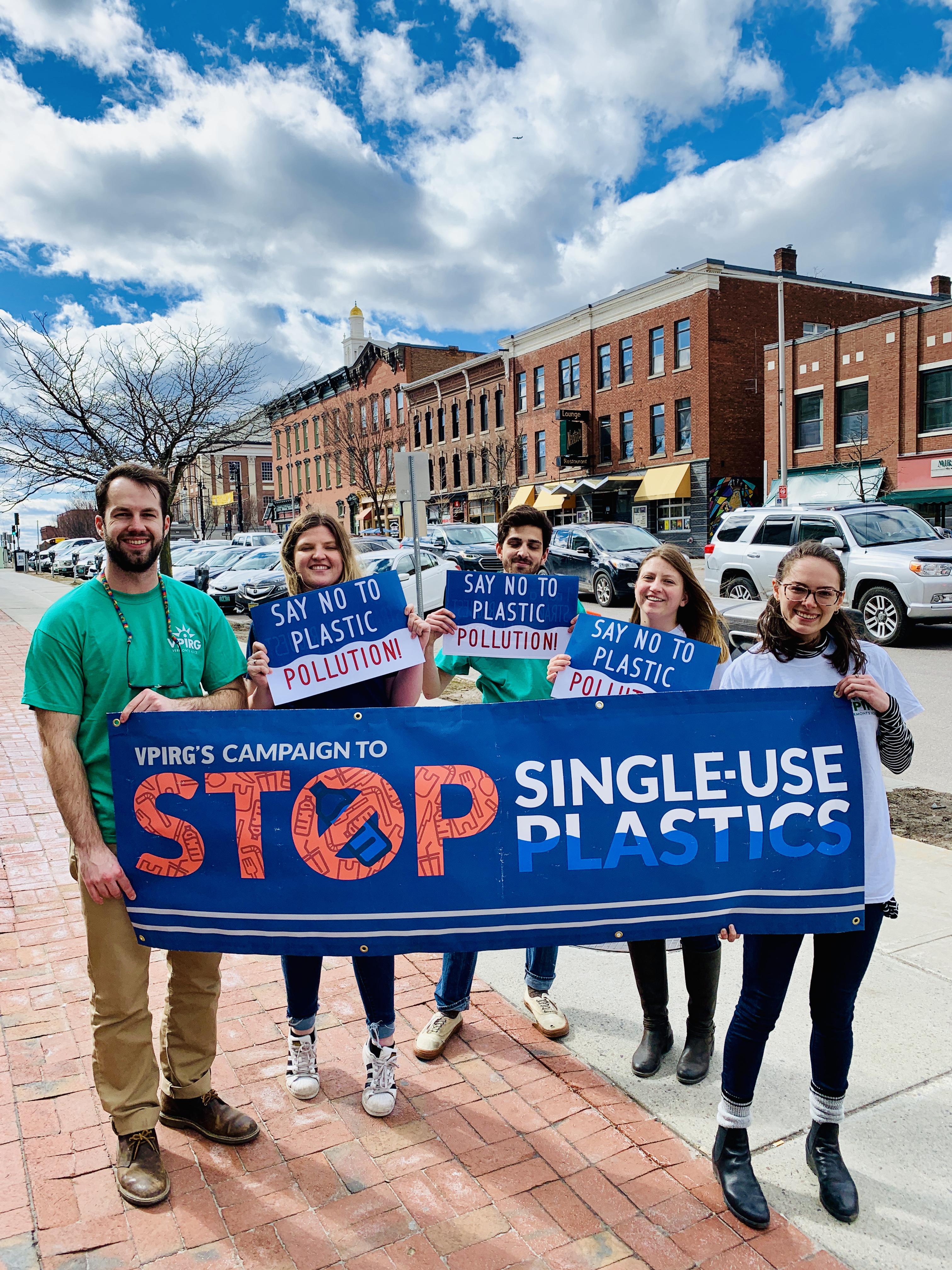
2020 Priorities
Listed below are some of the immediate opportunities for Vermont to take action this year.
>> Click here to download a PDF of our 2020 Priorities
Most of these ideas were generated by the State’s Single-Use Products Working Group, and many have passed or are being considered in other states throughout the country. VPIRG urges Vermont legislators to pass these complementary policies together as one law in 2020.
Set a Goal to Cut Packaging Waste
Vermont should aim to eliminate single-use packaging that is toxic, non-recyclable or non-biodegradable. Specifically, Vermont should adopt a goal to cut plastic packaging by 75% by 2030. This is the same numeric goal that California – the world’s sixth leading economy and another leader on plastics policy solutions – is considering.
Ban the use of Unnecessary Single-Use Products in the State
While the bans enacted in Vermont last year were a great start, there are additional unnecessary single-use plastic products that can be replaced by reusable alternatives. Policymakers should take immediate steps to transition Vermonters away from these products.
- Disposable Hotel Toiletries: Require lodging establishments to provide their customers with toiletries (such as shampoo and conditioner) in bulk dispensers rather than throwaway containers (those under 6 oz in size). Many leading hotel chains are already making this transition as part of their sustainability practices. The Governor of California signed this into law in October 2019.
- Plastic Food Ware Items: Plastic utensils, condiment packets, and other single-use food ware items are often provided to customers, whether they request it or not. Many of these items are neither recyclable nor biodegradable. Others may contain toxic additives. California, Indiana, Massachusetts, New York, Maine, and Washington are considering various legislative models to reduce or eliminate the use of these products at the state level. Municipalities across the country have also adopted or are considering similar approaches.
- Single-Use Tobacco Products: Cigarette filters and electronic cigarette cartridges are large contributors to plastic pollution and litter in Vermont and around the world. According to the U.S. Surgeon General, cigarette filters may actually contribute to higher risks of lung cancer in smokers. A phaseout of the single-use filters, which are filled with toxins and non-biodegradable plastic once discarded, could benefit public health and the environment. New York and California are two of the states considering bans on single-use tobacco products that are not biodegradable or mandating a producer take-back program could help reduce pollution caused by these products.
Promote a Circular Economy Model
Vermont should work to reduce the overall amount of virgin material in products and find re-uses for products after their end life to decrease waste generation in the state.
- Modernize Vermont’s Bottle Bill: Vermont’s Bottle Bill recycling program has been incredibly successful for nearly five decades, but it’s time to update the law to include beverages like bottled water, as well as wine and hard cider, and increase the deposit from five to ten cents. This would add up to 200 million more containers into the program each year and would ensure that there would be a clean stream of recycled glass, aluminum and plastic available to create new beverage containers and other products. The bill could also include language to encourage more commingling of containers at redemption centers. Connecticut, Hawaii, Iowa, Massachusetts, Maine, Michigan, Oregon, California, and New York already have Bottle Bill programs that include water bottles. California, Iowa, Maine, and New York include wine in their Bottle Bills.
- Adopt Recycled Content Standards: By requiring beverage manufacturers (and perhaps others) to comply with gradually increasing standards for recycled content in their single-use packaging material, we can reduce the use of virgin material (like petroleum products derived from fracking) and create new markets for recycled materials so we don’t have to ship them to faraway lands. California and Maine have both introduced recycled content measures into their legislatures.
Implement an Extender Producer Responsibility (EPR) Program
Although this would require implementation over the longer-term, Vermont should begin to consider the creation of an EPR program as a complement to our existing Bottle Bill program, that would hold producers of single-use products responsible for the waste they create. This would decrease the burden on municipalities and incentivize companies to come up with creative solutions to the waste crises we are facing in the country, as they would be the ones paying for it.
An effective EPR system should also include eco-modulated fee rates, based on:
- The level of recyclability of the packaging used (existing technology, composite products, packaging that interferes with recycling overall, use of hazardous or toxic additives etc.)
- The amount of recycled content used in packaging materials
- The use of non-toxic compostable or biodegradable materials
California, Georgia, Indiana, Massachusetts, Maine, North Carolina, Hawaii, Texas, and Arkansas are all considering implementing EPR systems using varied program designs.
